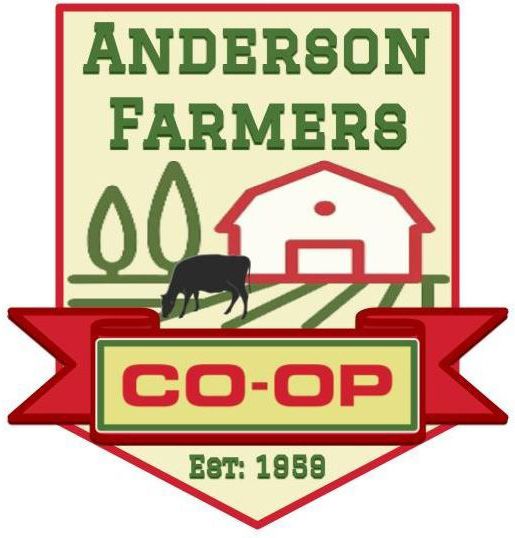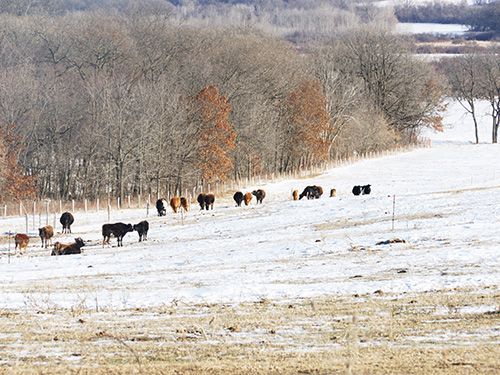The Benefits of Winter Pasture Care and Rotational Grazing
For cattle producers, summer is the season of several concerns not the least of which is pinkeye. Though pinkeye can be a tough disease to control, a thorough understanding of this disease will make dealing with this troublesome infection less frustrating.
Pinkeye is a bacterial infection that infects the eyes of cattle and is transmitted by the face fly. Most of these infections are caused by Moraxella bovis. Symptoms of pinkeye can vary and may be mild to severe. Many cases start out as excessive tearing or “watering” of the eye. Cattle may be sensitive to light and may have a visible “spot” in the eye. Some cases may progress to corneal edema which appears as a blue-colored eye or possibly even to a full-blown abscess of the eye. Most cases of pinkeye respond well to injectable oxytetracycline. The long-acting product works well since many cases will not have to be treated more than once with that product. Some resistant strains or the bovoculi strain may require a stronger antibiotic for treatment.
Controlling pinkeye must be a multifaceted approach. Since pinkeye is transmitted by the face fly, the cornerstone of any control program must be fly control. Face fly ear tags are essential to good fly control. The recommendation is one tag in each ear of adult cattle and one tag for calves. Measures to control eye irritation are also important; therefore, keeping pastures clipped is extremely important. Vaccination is another key component of good pinkeye prevention. Currently, available vaccines do a good job of helping prevent Moraxella bovis. Some recent research even suggests that vaccination in the face of a pinkeye outbreak has some benefit in controlling/preventing new cases of pinkeye. Finally, making sure that the animal is in a good nutritional plan will ensure that the immune system is able to function at its best. This will allow vaccines to work properly and also ensure the animal’s natural defenses are fully effective.
While pinkeye can certainly be a challenging summer problem, a full understanding of this infection can help mitigate some of the difficulties associated with the infection.
Check with your local Coop to find health and nutritional products that can help control and/or prevent pinkeye. For more content like this, check out the latest issue of The Cooperator.
Read More Local News
Essential Steps for Winterizing Your Vehicle
Many regions of the state recently experienced the first cold front of the season. One of the essential tasks often overlooked during this time is winterizing your vehicle. Ensuring your vehicle is ready for the cold, icy roads can prevent breakdowns and accidents, keeping you and your family safe throughout the season.
Keep reading for eight steps to winterize your vehicle and make sure it’s ready to navigate the winter landscape.
To read this article click the link below.
Managing Mud, Manure, and Moisture During the Winter
Winter tends to bring unique challenges for farmers. Especially when it comes to managing our muddy soils, and excess of moisture in your soil. Add the heavy foot traffic your livestock, and the manure buildup can quickly turn barns, lots, and walkways into problem areas if not managed effectively.
To read this article click the link below.
Begging for Leftovers
During the winter, it is more likely for farm dogs to sneak their way into our homes at night. After all, who can resist a pitiful pair of puppy dog eyes? If they are lucky, you will let them inside just after the sun sets, presenting them a golden opportunity for sniffing, scrounging, and begging under the kitchen table during your family’s dinnertime.
To read more on this article click the link below
The Art of Wood Stacking
As the familiar chill of winter sets in, there’s nothing quite like the warmth and ambiance of a crackling fire. For those who rely on wood-burning fireplaces to keep the cold at bay, the way you stack your wood is a crucial element in ensuring a steady and efficient heat source.
There are many different wood stacking techniques to create a well-organized woodpile in the space you have available. If your woodpile is in a noticeable location, there are several methods that offer tons of aesthetic appeal for only a minimal amount of effort. Keep reading this blog for five wood stacking methods to experiment with this winter.
To read more on this article click the link below


Share On: